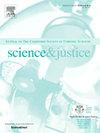Transfer and persistence of owner DNA on domestic pets
IF 1.9
4区 医学
Q2 MEDICINE, LEGAL
引用次数: 0
Abstract
Domestic pets are frequently present at crime scenes, the homes of victims and suspects, and other persons of interest associated or allegedly associated with a crime. The presence of traces of animal deoxyribonucleic acid (DNA) at a scene can be an investigative lead but could our furry friends also be depositing our DNA along the way? Routine contact with our domestic pets from a pat on the head, kisses, and hugs may all result in transfer of our DNA to an animal. In an effort to explore this possibility, the background human DNA on domestic pets was measured and whether any DNA attributable specifically to the owner of the domestic pet was assessed. Finally, whether the pet would transfer the owner’s DNA onto a smooth surface item was also evaluated. Ten domestic pets comprised of felines and canines were utilized for this study. None of the secondary transfer samples produced profiles that would be considered suitable for comparison to known DNA profiles or eligible to be uploaded to a DNA database. Approximately 53 % of all samples collected directly from the pet produced DNA profiles that provided support for the DNA profile under the proposition that the primary pet owner is a contributor rather than an unknown person is to the DNA profile obtained from the sample. However, it is unlikely to have results that support that the source of the DNA is the owner, rather than an unknown person, when the DNA is taken from an item that has been touched by the pet.
求助全文
约1分钟内获得全文
求助全文
来源期刊

Science & Justice
医学-病理学
CiteScore
4.20
自引率
15.80%
发文量
98
审稿时长
81 days
期刊介绍:
Science & Justice provides a forum to promote communication and publication of original articles, reviews and correspondence on subjects that spark debates within the Forensic Science Community and the criminal justice sector. The journal provides a medium whereby all aspects of applying science to legal proceedings can be debated and progressed. Science & Justice is published six times a year, and will be of interest primarily to practising forensic scientists and their colleagues in related fields. It is chiefly concerned with the publication of formal scientific papers, in keeping with its international learned status, but will not accept any article describing experimentation on animals which does not meet strict ethical standards.
Promote communication and informed debate within the Forensic Science Community and the criminal justice sector.
To promote the publication of learned and original research findings from all areas of the forensic sciences and by so doing to advance the profession.
To promote the publication of case based material by way of case reviews.
To promote the publication of conference proceedings which are of interest to the forensic science community.
To provide a medium whereby all aspects of applying science to legal proceedings can be debated and progressed.
To appeal to all those with an interest in the forensic sciences.
 求助内容:
求助内容: 应助结果提醒方式:
应助结果提醒方式:


